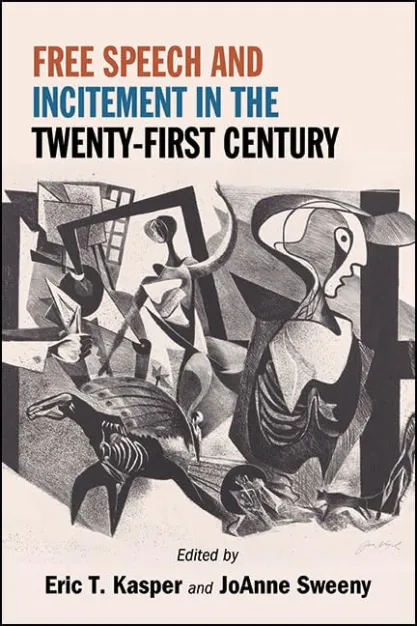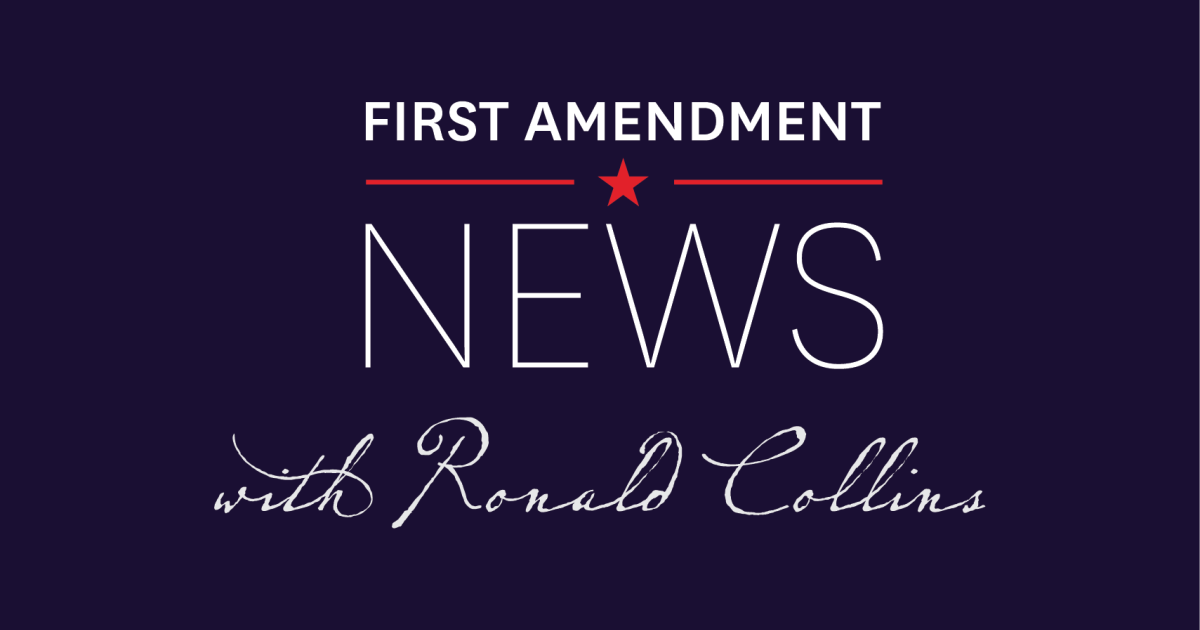“Whoever would overthrow the liberty of a nation must begin by subduing the freeness of speech.” — Benjamin Franklin
If you look beneath the veneer of it all, what surfaces from the chaos of the last eight weeks is a demand for unyielding loyalty to a man and his personal and political whims.
His demands, followed in fear, are cravenly honored by political figures, media corporations, university presidents, law firms, Justice Department lawyers, and all others who surrender on bended knee to an authoritarian figure who holds the title of the 47th president of the United States.
Few stand up to him; many kowtow to him. Silence and sycophancy surround him. Meanwhile, his agency hitman exercises power with unconstitutional zeal.
When persuasion fails, when logic departs, when toleration ceases to be tolerated, and when the very pillars of freedom of expression are battered with ruinous consistency, then the promise of the First Amendment is breached with abandon — this while so many fiddle.
Given what has gone on in the first quarter of 2025 alone, this much is true: We are witnessing frontal attacks on freedom, especially our First Amendment freedoms (e.g., FANs 463, 462, 461, and 460).
Government by executive order is his calling card — his “trump” card. Shakedowns are his tactic. “Administrative error” is the justification given by his confederates for egregious due process violations.
No matter how personal, punitive, or partisan, this power (often unconstitutional in principle and authoritarian in practice) has become this administration’s default position. His will is effected by his lieutenants, implemented by his attorney general, executed by his DOGE goons, fulfilled by his FBI director and other cabinet officials, orchestrated by his deputy of policy, and defended by his press secretary.
In such ways, as professor Timothy Zick’s “Executive Watch” posts have revealed and will continue to reveal, the First Amendment is also under siege.
Fear is the engine that drives so much of this aggrandizement of power, and the submission to it. As in the McCarthy era, robotic loyalty fuels that engine. What we are seeing in Washington is a new era in compelled allegiance. Executive order “negotiations” are premised on mandatory loyalty.
To get a sense of the nature of this problem, simply consider some of what Thomas I. Emerson (a revered civil liberties and free speech scholar) wrote 55 years ago in his seminal “The System of Freedom of Expression.” When liberty is contingent on one’s “beliefs, opinions, or associations,” there is a “grossly inhibiting effect upon the free exercise of expression.”
The inevitable result, Emerson added, is to silence “the more conscientious and invite the less scrupulous to pass. ‘Self-executing’ by its nature, it places the burden upon the person…to interpret [the loyalty oaths’] purpose, recall all past events in his life, and decide what current or future [orders might affect him] at his peril.” The net effect is to leave citizens “at the continuing mercy” of the government.
Put bluntly: “It is inherently demeaning to a free people.” (emphasis added)
It is that fear, born of direct or veiled demands for loyalty, that has seized power in the control rooms of our government. Time and again, day in and day out, yet another executive order, followed by servile enforcement, abridges our First Amendment freedoms. When will it end? When will enough men and women of courage join together and say “enough”? One answer was tendered in 1776 in a work titled “The American Crisis.” To quote its author, Thomas Paine:
These are the times that try men’s souls. The summer soldier and the sunshine patriot will, in this crisis, shrink from the service of their country; but he that stands by it now, deserves the love and thanks of man and woman.
Related
To preserve America’s tradition as a home for fearless writing, the Foundation for Individual Rights and Expression and Substack are partnering to support writers residing lawfully in this country targeted by the government for the content of their writing — those who, as Hitchens once put it, “committed no crime except that of thought in writing.”
If you fit this category, whether or not you publish on Substack, we urge you to get in touch immediately at thefire.org/alarm or pages.substack.com/defender.
- The Associated Press, “Trump Task Force To Review Harvard’s Funding After Columbia Bows to Federal Demands,” First Amendment Watch (April 1)
- “How law firms are fighting Trump’s executive orders,” CBS (March 31)
- Caroline G. Hennigan and Bradford D. Kimball, “More Than 80 HLS Professors Denounce Trump Admin Attacks on Law Firms in Letter to Students,” The Harvard Crimson (March 29)
- Eugene Volokh, “Paul Clement’s Argument Against the Executive Order Targeting the WilmerHale Law Firm,” The Volokh Conspiracy (March 28)
- Mark Berman, Perry Stein, and Jeremy Roebuck, “Judges block Trump penalties for two law firms as he strikes deal with third,” The Washington Post (March 28)
- Pramila Jayapal, “We Have to Stand Up and Fight Back,” The Nation (March 27)
Coming Soon
A Question and Answer interview with Janie Nitze, co-author with Justice Neil Gorsuch of “Over Ruled: The Human Toll of Too Much Law.”
See “An open invitation to Justice Neil Gorsuch and Janie Nitze to reply to their new book’s critics,” FAN 444 (Oct. 23)
Voice of America court victory in journalists’ firing case
The Voice of America can’t be silenced just yet. A federal judge on March 28 halted the Trump administration’s efforts to dismantle the eight-decade-old U.S. government-funded international news service, calling the move a “classic case of arbitrary and capricious decision making.”
Judge James Paul Oetken blocked the U.S. Agency for Global Media, which runs Voice of America, from firing more than 1,200 journalists, engineers and other staff that it sidelined two weeks ago in the wake of President Donald Trump’s ordering its funding slashed.
Seth Stern on DOGE and related free speech issues
First Amendment Watch spoke with director of advocacy at Freedom of the Press Foundation, Seth Stern, about the First Amendment issues baked into the online exchange. Stern described Martin’s letter as intentionally ambiguous, argued that confusion over DOGE as a quasi-government agency brings its transparency responsibilities into question, and described the free speech issues that may arise from Musk’s roles as a social media platform owner and advisor to the president.
Yale Law School ‘Free Speech in Crisis’ conference
Agenda
Friday, March 28
9:15 a.m. | Welcome/Opening Remarks
- Organizers: Jack Balkin, Genevieve Lakier, Mikey McGovern
9:30 a.m. | Panel 1: Media Environment
- Chair: Paul Starr, Princeton University
- Yochai Benkler, Harvard Law School
- Mary Anne Franks, George Washington University School of Law
- Eugene Volokh, Hoover Institution
11:15 a.m. | Panel 2: Polarization
- Chair: Robert Post, Yale Law School
- Nicole Hemmer, Vanderbilt University
- Liliana Mason, SNF Agora Institute, Johns Hopkins University
- Ganesh Sitaraman, Vanderbilt Law School
2:15 p.m. | Panel 3: Political Marketplace
- Chair: Rick Hasen, University of California, Los Angeles School of Law
- Rick Pildes, NYU Law School
- Bradley A. Smith, Capital University Law School
- Ann Southworth, University of California, Irvine School of Law
4:00 p.m. | Panel 4: Workplace
- Chair: Amanda Shanor, University of Pennsylvania
- Helen Norton, University of Colorado School of Law
- Benjamin Sachs, Harvard Law School
- Liz Sepper, University of Texas Law School
Saturday, March 29
9:30 a.m. | Panel 5: Knowledge Production
- Chair: Amy Kapczynski, Yale Law School
- E.J. Fagan, University of Illinois Chicago
- Vicki Jackson, Harvard Law School
- Naomi Oreskes, Harvard
11:15 a.m. | Panel 6: Campus Politics
Chair: Genevieve Lakier, University of Chicago Law School
- Judith Butler, University of California, Berkeley
- Athena Mutua, University at Buffalo School of Law
- Keith Whittington, Yale Law School
1:00 p.m. | Wrap-Up Conversation
- Organizers: Jack Balkin, Genevieve Lakier, Mikey McGover
Forthcoming book on free speech and incitement

Free Speech and Incitement in the Twenty-First Century explores the line between free speech and incitement, which is a form of expression not protected by the First Amendment. Incitement occurs when a person intentionally provokes their audience to engage in illegal or violent action that is likely to, or will, occur imminently.
This doctrine evolved from World War I through the Cold War and the civil rights movement era, culminating in a test announced by the U.S. Supreme Court in Brandenburg v. Ohio (1969). Since the 1970s, this doctrine has remained largely unchanged by the Supreme Court and, as such, has received relatively little academic or media attention.
Since the late 2010s, however, violence at political rallies, armed protests around Confederate statues, social unrest associated with demonstrations against police, and an attack on the U.S. Capitol have led to new incitement cases in the lower courts and an opportunity to examine how incitement is defined and applied. Authors from different perspectives in Free Speech and Incitement in the Twenty-First Century help the reader understand the difference between free speech and incitement.
‘So to Speak’ podcast on Columbia University, DEI, and law firms
We explore how censorship is impacting institutions — from universities to law firms to the Maine House of Representatives.

More in the news
- Thomas Maxwell, “Judge Kills Social Media Age Verification Law, Says It Violates the First Amendment,” Gizmodo (April 1)
- Eugene Volokh, “The 2024 Presidential Campaign Saw a Massive Disinformation and Misinformation Campaign,” The Volokh Conspiracy (March 31)
- The Associated Press, “US Immigration Officials Look To Expand Social Media Data Collection,” First Amendment Watch (March 31)
- David Bauder, “Associated Press, banned from White House press pool, renews request to court for reinstatement,” Free Speech Center (March 28)
- Sofia Lopez, “FIRE-supported Utah legislation secures students’ rights to freely associate on campus,” FIRE (March 27)
2024-2025 SCOTUS term: Free expression and related cases
Cases decided
- Villarreal v. Alaniz (Petition granted. Judgment vacated and case remanded for further consideration in light of Gonzalez v. Trevino, 602 U. S. ___ (2024) (per curiam))
- Murphy v. Schmitt (“The petition for a writ of certiorari is granted. The judgment is vacated, and the case is remanded to the United States Court of Appeals for the Eighth Circuit for further consideration in light of Gonzalez v. Trevino, 602 U. S. ___ (2024) (per curiam).”)
- TikTok Inc. and ByteDance Ltd v. Garland (The challenged provisions of the Protecting Americans from Foreign Adversary Controlled Applications Act do not violate petitioners’ First Amendment rights.)
Review granted
Pending petitions
Petitions denied
Free speech related
Thompson v. United States (Decided: 3-21-25/ 9-0 with special concurrences by Alito and Jackson) (Interpretation of 18 U. S. C. §1014 re “false statements”)
Last scheduled FAN
FAN 463: ‘We simply could not practice law . . . if we were still subject to the executive order’
This article is part of First Amendment News, an editorially independent publication edited by Ronald K. L. Collins and hosted by FIRE as part of our mission to educate the public about First Amendment issues. The opinions expressed are those of the article’s author(s) and may not reflect the opinions of FIRE or Mr. Collins.


